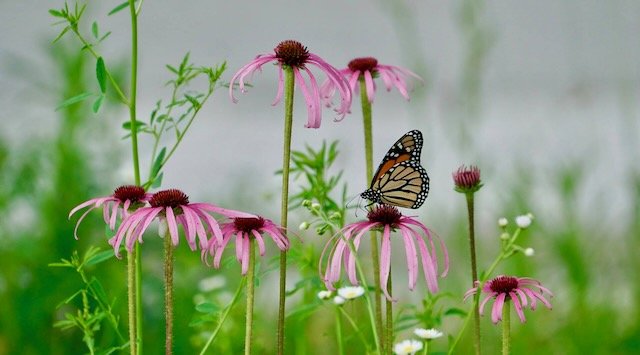Everyone enjoys the variety of butterflies and moths, but did you know that there is also a huge variety of grasshoppers, ants, bees, flies, etc.? Insects are very important as pollinators and one of the lower items on the food chain for birds and animals.
There have been various news articles in recent years about the plight of honey bees and monarch butterflies. Habitat loss and the use of insecticides and pesticides played a role in their decline. But there are some simple things we can do to play a role in preventing their decline.
When you spray to get rid of an unwanted insect pest, you may also be harming several beneficial insects as well. A natural remedy would be just as effective and not as harmful to the environment. Consider using natural remedies for garden pests in your own gardens to help protect our pollinators. You can find a list of harmful and “friendly” remedies for garden pests at MU Extension’s website. http://extension.missouri.edu/p/g7274
Another suggestion is to plant native varieties. Native plants require less maintenance and are more beneficial to insects. Exotics are okay for some of your plantings—but you should check to make sure they are not invasive before you plant.
Most of our drinking water comes from rivers, lakes and wells. What we put on the ground may end up in our drinking water. A corridor of trees and plants along streams helps clean up the run-off of fertilizers and pesticides from agriculture fields. Rain gardens help do the same in yards. Human and animal urine affects life in the river as does discarding trash in the river and along the banks. Helping to clean up river corridors, planting along rivers and streams, and building rain gardens all will help protect our drinking water.
In the past, Native American Indians honored and cared for the land they lived on, and today we are now the custodians of the earth. Just thinking of ourselves as custodians of the earth is the first step to using some of these simple solutions to save and protect our environment.
Creation is a beautiful tapestry with everything in nature connected---try not to unravel it. Get outside and go exploring, even if it is in your own backyard. You may be amazed at what you find and what you can learn.



